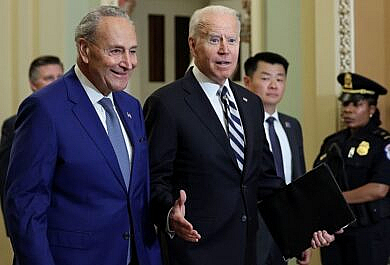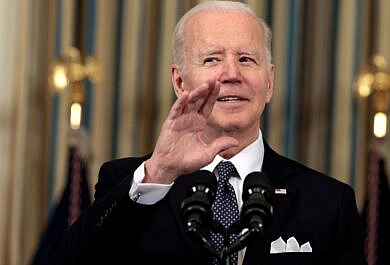In the 21 days since former Speaker Kevin McCarthy’s ouster, House Republicans have cycled through two speakers-designate – Steve Scalise and Jim Jordan – to no avail. Can one of the new candidates break the logjam?
Summary
In the 21 days since former Speaker Kevin McCarthy’s ouster, House Republicans have cycled through two speakers-designate – Steve Scalise and Jim Jordan – to no avail. With the only GOP-controlled branch of government paralyzed, Republicans hope one of the nine candidates for Speaker can break the logjam so the House can get back to the business of governing.
- The nine GOP candidates for speaker made their case to their colleagues at a Monday night forum ahead of Tuesday’s internal vote to pick the next Republican nominee to lead the House of Representatives.
- The candidates were quizzed on several political and procedural topics at the forum, including how they would handle the looming government shutdown set to begin on Nov. 17. The speaker-designate needs the support of 217 out of 221 House Republicans to win the post on the House floor.
- Conference rules require a speaker-designate to win the support of a majority of the conference. If no candidate wins a majority, then the candidate with the least support is eliminated and another vote is held. Voting starts at 9:00am Tuesday and multiple rounds of balloting are likely.
- One candidate, Rep. Dan Meuser (R-PA), dropped out of the race last night but declined to get behind any of his eight remaining opponents. All candidates have signed a pledge created by Rep. Mike Flood (R-NE) to support the eventual nominee on the House floor.
The eight candidates for speaker include:
- Rep. Tom Emmer (R-MN) – House Majority Whip. Emmer is the highest-ranking member of leadership to run for speaker this round. Emmer is the frontrunner but concerns about his relationship with former President Donald Trump and his vote certify the 2020 election could hurt his chances. Emmer spoke with Trump over the weekend and Trump is staying out for now. Emmer previously ran the National Republican Congressional Committee (NRCC) in 2020 when Republicans picked up 15 seats and 2022 when they took back the House. Emmer was the GOP nominee for Governor of Minnesota in 2010 and was first elected in Congress in 2014.
- Rep. Mike Johnson (R-LA) – vice chairman of the House Republican Conference. Johnson is a lower-ranked member of leadership and was previously the chair of the influential Republican Study Committee. Johnson was first elected to Congress in 2016.
- Rep. Gary Palmer (R-AL) – chairman of the Republican Policy Committee. Palmer worked for conservative think tanks before his election to Congress in 2014 and his current role is essentially the legislative equivalent.
- Rep. Pete Sessions (R-TX) – the most experienced candidate in the field. Sessions served in the House from 1997 until he lost reelection in 2018 but returned to the House after mounting a comeback bid in a neighboring district in 2020. Sessions served as NRCC chairman from 2009 to 2013, then as chairman of the powerful Rules Committee from 2013 to 2019.
- Rep. Kevin Hern (R-OK) – the chairman of the Republican Study Committee, a large and influential bloc of conservatives. Past chairs include leadership rival Johnson, Scalise, Jordan, and former Vice President Mike Pence. Hern built an empire of McDonald’s franchises in the Tulsa area before he was first elected to Congress in 2018.
- Rep. Austin Scott (R-GA) – first elected in the 2010 Tea Party wave. Scott opposed Jordan in last week’s internal vote and lost 124-81 despite running a last-minute campaign and his professed disinterest in serving as speaker. Serves on the Armed Services and Agriculture panels.
- Rep. Byron Donalds (R-FL) – the most junior speakership contender, Donalds was first elected in 2020. Donalds has become a prominent member of the House Freedom Caucus in his term-and-a-half in Congress and is a frequent guest on cable news. Donalds received several protest votes for speaker on the House floor during the votes for McCarthy in January and Jordan last week.
- Rep. Jack Bergman (R-MI) – a retired Marine lieutenant general who represents Michigan’s Upper Peninsula. Bergman has pledged that if he wins, he would merely serve as speaker through the end of the 118th Congress to steady the ship and provide stabilizing leadership.
![]()
- The New York Times explored the “Five Families” of the House GOP and the “web of overlapping blocs that have made the party nearly ungovernable.” The Five Families – the allusion to New York’s rival Mafia crime families is intentional – include the Problem Solvers Caucus of more moderate and swing-district members, the Republican Governance Group of institutionalists, the pro-business Main Street Caucus, the solidly conservative Republican Study Committee, and the House Freedom Caucus on the conference’s right-wing fringe.
- The Washington Post reported, “While Emmer is considered the front-runner in the race, Donalds has surprised many lawmakers by gaining traction across several ideological factions. Serving in his second term, some fear Donalds, 44, is too green to be speaker. But advocates say he has built relationships across the conference, with many citing his personality as a key factor in proving himself to pragmatic Republicans after trying to negotiate a deal to extend government funding last month.”
- CNN noted, “Winning a majority party’s nomination for speaker of the House of Representatives usually elevates a lawmaker into the pantheon of American political leaders. But such is the toxicity of the GOP three weeks after the ouster of Speaker Kevin McCarthy that the nominee expected to emerge on Tuesday may never get the top job. The nomination is an assignment to what may be an impossible political mission to unite a conference that might never be reconciled. And even if the nominee wins the gavel, the next speaker has a reasonable chance of a tenure even shorter than McCarthy, who lasted nine months.”
![]()
- The Wall Street Journal observed, “While many lawmakers have yet to publicly endorse a candidate, support appeared to pool around House Majority Whip Tom Emmer (R., Minn.); Republican Study Committee chairman Rep. Kevin Hern (R., Okla.); House Republican conference vice chairman Rep. Mike Johnson (R., La.); and Byron Donalds of Florida, an ally of former President Donald Trump.”
- Former President Trump declined to endorse a candidate in the race, as the Washington Examiner reported. ““That four threshold is very tough. It’s a very tough thing no matter who it is,” Trump told reporters in New Hampshire. “There’s only one person that can do it all the way. Do you know who that is? Jesus Christ. If Jesus came down and said, ‘I want to be speaker,’ he would do it. Other than that, I haven’t seen anybody that can guarantee it.”
- The Editors of National Review demanded House Republicans “end the chaos” and observed “the core competency of the House Republican caucus has become preventing anyone from getting elected speaker of the House.” The editors concluded, “The famous story is that Benjamin Franklin, when asked after he exited the Constitutional Convention what form of government was decided on, replied, ‘A republic if you can keep it.’ The voters gave Republicans a House majority, and so far they aren’t demonstrating much interest in keeping it.”
© Dominic Moore, 2023






